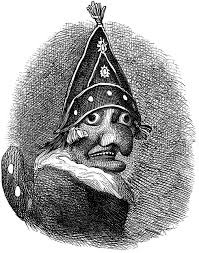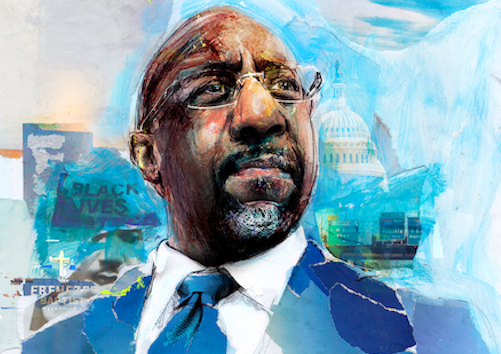Sunday Morning / December 11, 2022
Democratic Sen. Raphael Warnock defeated Republican challenger Herschel Walker in a Georgia runoff on Tuesday, ensuring Democrats an outright 51-49 Senate majority. “I often say that a vote is a kind of prayer for the world we desire for ourselves and for our children,” said Warnock, a former Baptist pastor and his state’s first Black senator. Moreover, Warnock is the first U.S. senator of color from a former confederate state.
As such, this pastor of the Ebenezer Baptist Church is poised to test a hypothesis laid down by the Colony of Georgia’s founder, James Oglethorpe, who upon arriving from Britain declared;
If we allow slaves, we act against the very principles by which we associated together, which is to relieve the distressed.
General James Oglethorpe and his fellow colonial trustees, the British Parliament, formally codified prohibition in 1735 but the ban remained in effect only until 1751; when Georgia's emergent planter class prevailed upon Parliament to reverse itself. The legal institution of human chattel slavery, comprising the enslavement primarily of Africans and African Americans, was prevalent in Georgia for 100+ years until 1865.
In January, Warnock will ascend the halls of Congress as the first full term U.S. Senator of color from Georgia. “I am Georgia,” he says, inheriting a state with $14.69 billion in debt and a population where 14% of its 10 million people live in poverty. His platforms, “Health. Jobs. Justice.” speak to the very class inequality his forebears created and the pastor isn’t making promises he can’t keep. His campaign slogan, “No, I Can’t” suggests he’s a man of principle, and on this occasion it’s at least worth remembering why his predecessor and other men of principle fail.
Ramblin’ Man
While the Europeans arrival in the Americas is relatively storied, the conception of the Colony of Georgia is unique. When James Oglethorpe, founder of British America’s Colony of Georgia, landed on the Yamacraw Bluff in 1733 his intention was to resettle Britain's prisoners in the New World.
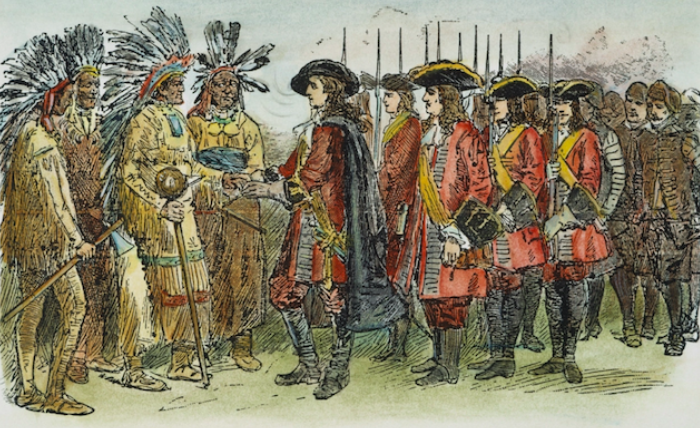
The Frigete Anne lands in Beaufort South Carolina circa 1733 via
A Minister of Parliament for Haslemere, Oglethorpe chaired the Gaols Committee; investigating the conditions of roughly 2000 people imprisoned for back payments to creditors. Considered the first social inquiry of the House of Commons (1729), the report was chronicled in Daniel DeFoe’s The Review, pointing the nation's attention to the appalling conditions in private debtor’s prisons.
While there were 12 London newspapers in 1729, DeFoe’s "Robinson Crusoe" had caught the world’s attention. Assimilating London’s “worthy poor” in a new colony was Defoe’s notion, and in 1733 life began to imitate art when Oglethorpe arrived on the Yamacraw Bluff in modern-day Savannah.
His tenure followed Robinson Crusoe like a script — encountering 30 wigwams, 200 indigenous Peoples’, even befriending their chief — Oglethorpe prohibited slavery in the “Georgia Experiment” and effectively partnered with Chief Tomochichi to create diplomacy missions to the court of King George II and beyond. Moreover, he aspired to build an enlightened society saying, “slavery will have a negative effect on the manners and morality of Georgia's inhabitants.” DeFoe put it this way in The Review, “It is never too late to be wise.”
Watermelon Crawl
Between 1650 and 1900, approximately 10.2 million men, women and children were captured in West Africa and shipped to Charleston, South Carolina.
Sold at public auctions — where government property is sold to the highest bidder — the Old Slave Mart is the last extant slave auction facility in existence today. For Charlestonians, it sits proudly on the National Register of Historic Places.
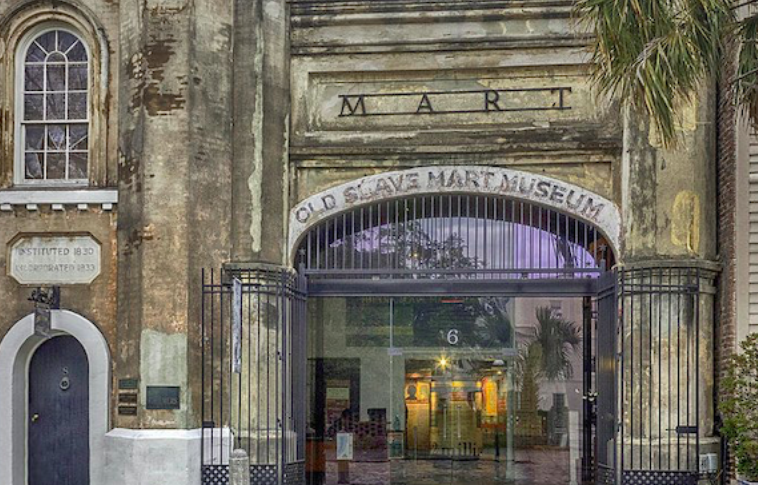
Old Slave Mart via Wikipedia
Separated from their families and scattered to the South Carolina Low-country, enslaved people created an alternative world view. The Gullah, for example, people of color not free to exercise the right to life turned to mysticism to codify their own laws, principles and morality.
Hoodoo, a unique language and set of spiritual practices unfamiliar to American slaveholders, evolved from various African religions, incorporating the indigenous people’s comprehensive botanical knowledge, too. In the Gullah South Carolina Low-country, Hoodoo came to be known colloquially as "Low-country Voodoo” and followed the Great Migration of African Americans throughout the United States.
Midnight Train to Georgia
Two miles west of downtown Savannah, Georgia, theres a historical marker in the center of a small plot of a fenced city park in a depressed area. It reads,
Slaveholder and absentee plantation owner Pierce Mease Butler authorized the sale of approximately 436 men, women, children and infants to be sold over the course of two days. The sale's proceeds went to satisfy Butler's significant debt, much of it from gambling. The auction is the largest single sale of slaves in U.S. history.
Savannah remains somehow frozen in time to its 12 million annual visitors who come to wander through her Victorian squares, underneath canopies of live oak, and into the historically preserved mansions and slave quarters of the past.
The Sorrel-Weed House, in particular, was built in 1840 and the subject of fantastical speculations by Ghost Hunters, HGTV’s “If Walls Could Talk” and Ghost Adventures. Specifically, it was the tragic double suicide of the mansion’s matron and mistress that draws less upon our interest in ghosts than upon a universal tension between good and evil.
When Francis Sorrel married the former Matilda Moxley in 1829, a persistent urban legend claims he'd installed a 28-year old mistress named Molly above their carriage house. A slave manifest aboard the Augustus confirms they'd traveled together during the season, but it was an authenticated letter that confirmed their affair. Charles Jones writes;
The sad news has reached us that Matilda Sorrel has leaped from the third story of the mansion; falling to the pavement of the courtyard and terminating her life.
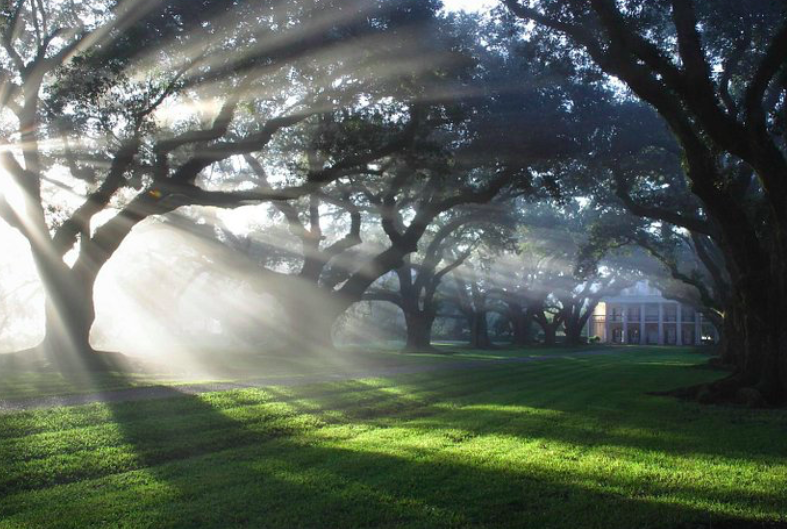
Savannah Georgia
Two days later, Jones receives a reply;
The death of Mrs. Sorrel was very distressing. We hear that she was subject to great mental depressions and we're not sufficiently grateful, neither for our reason nor our station, for our commonest blessings are the greatest. We need only to be deprived of them to feel it so.
Slave schedules in 1862 — the year of the Emancipation Proclamation — reveals that 2000 mulattoes traveled to and from the city of Savannah with a quizzical paradox. While a master legally owned his slave until 1862, interracial relations and marriage was criminalized for the next 100 years.
The U.S. Supreme Court would correct that institution by legalizing interracial marriage in 1967 (Loving v. Virginia), but it’s the high cost of living, abortion, and the economy that top Georgians' concerns today. Like their forebears, their concerns speak to a resounding class struggle.
Master, Slave Morality
The philosopher Friedrich Nietzsche, perhaps the greatest influencer of 20th century political thinkers, argued there are only two kinds of morality: Master Morality is informed by pride and power; Slave Morality by kindness, empathy and sympathy. While the former explains actions as either good and bad; the latter knows they're just good or evil.
Remembered for declaring "God is dead," Friedrich Nietzsche exerted a profound influence on modern intellectual history by challenging existential philosophers like Heidegger, Sartre and Jung to explain the existence of faith.
The Age of Enlightenment called mankind to reason, and mathematician Kurt Godel's ontological proof for the existence of God was accepted as logic in 1941. However, it was the slaves and martyrs of the U.S. South who'd always known there were more than enough seats in heaven.
Georgia on my Mind
Oglethorpe’s ban on slavery while philanthropic was eerily practical. Spain had a colonial presence in Florida in 1735 and recruited slaves elsewhere in Colonial America into military service in exchange for their freedom.
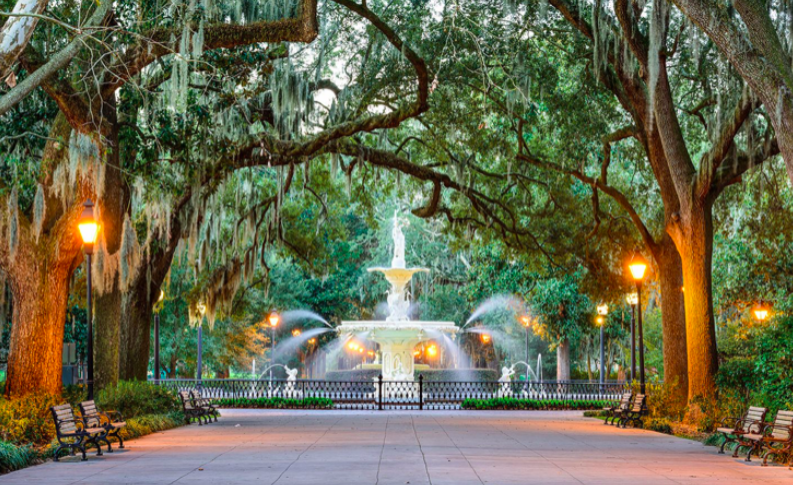
Forsyth Park
When General Oglethorpe won a resounding victory over the Spanish in the Battle of Bloody Marsh in 1742, effectively ending Spanish expansionism in North America, Oglethorpe's greatest military victory sealed the fate of the "Georgia Experiment." While American slaves comprised one-half of the population on the eve of the American Revolution, they were instantaneously competing with the nation’s 30 million people following abolition for work.
The Class Struggle — a conflict between the workers and ruling class in a capitalist society — is inevitably violent, and for this reason the framers originally created a Senate within the Constitution;
To protect the rights of individual states and safeguard minority opinion in a system of government designed to give greater power to the national government.
While Oglethorpe failed in this regard, the question to Warnock is not if or whether he’s a man of principle, but rather how long his fine principles will be practical?


